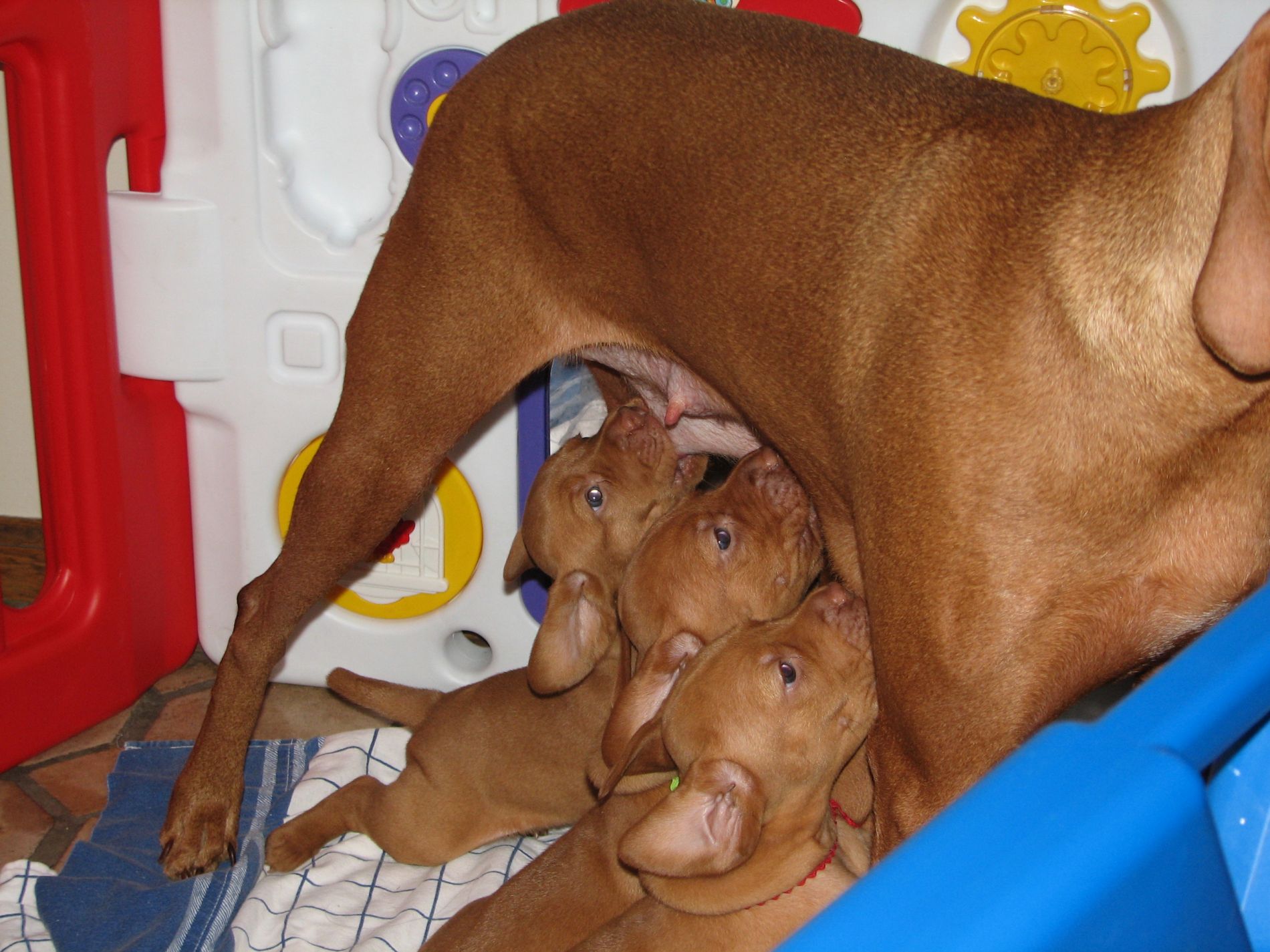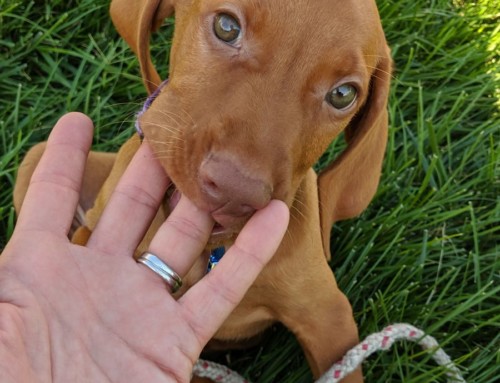DOG TRAINING OFFERED IN-PERSON AND ONLINEOur dog training services are delivered in almost any format that meets your needs. We have GROUP CLASSES at our indoor and outdoor facilities on our farm, ONLINE LIVE STREAMING classes, and SELF-PACED VIDEO-BASED training through our Online Dog Training Course. Our PRIVATE TRAININGS can be done in-home, outside, in public dog-friendly locations, at our facility on our farm, online via phone or video conferencing and through email. |
You've decided to add a new dog to your household. How do you go about choosing a reputable dog breeder?
You've weighed the choice between a puppy, an adolescent, an adult or a senior dog and decided your household has the time and energy for a puppy.
You've weighed the option of going through a rescue/shelter or going to a breeder, and you have chosen this time to go through a breeder for a puppy.
You have done your research on what breed you want.
Now you need to find a reputable breeder so you know you are getting a puppy who had the best chance at being healthy both physically and temperamentally.
How do you know if a breeder is a reputable breeder who places the health and well-being of their breed above all else? How do you avoid puppy mill breeders who do not focus on improving on the quality of the breed? Some puppy mill breeders have some slick marketing that will make it harder to tell the difference.
So you need to do your research and keep an eye out for some possible red flags that can clue you in as to who you are seeing. Here is our process for choosing a reputable dog breeder.
1. Is the breeder open to answering all of your questions?
They should be.
A reputable breeder wants to ensure their puppies are going to quality homes that will be most likely to provide a great home for their puppies for the rest of their lives. They like people who do their homework and are making sure a puppy from them will be a good fit.
2. Does the breeder have questions for you – usually in the form of a questionnaire you must complete – before you can be considered for one of their puppies?
They should have questions to help determine if you are a good fit for both the breed of dog you want AND for a puppy.
Choosing a reputable dog breeder means they will weed out a lot of people who are not a good fit just on these questions.
If they only want to know if you can pay for the puppy and don't care about anything else, they are NOT a reputable breeder.
There's your first big red flag to look elsewhere.
3. Does the breeder have a contract you must sign before getting a puppy from them? Does it contain a clause that states they have first option for the dog if you find a need to re-home the dog?
Choosing a reputable dog breeder means they will want the dog back so they can find a suitable home if you are not able to keep the dog.
If they take zero responsibility once you pay and leave with the puppy, there's another red flag. You might want to look elsewhere.
Many contracts from reputable breeders will also include some sort of expectation of getting started on training your puppy right away and hopefully expressly focusing on positive reinforcement-based training. This is to help ensure you are doing the right things to get this puppy off to a good start and taking responsibility for your new puppy.
4. Does the breeder do health testing for the common health issues for that particular breed – such as hips, eyes, etc.?
Both parents should be tested and dogs typically should be at least two years old before being bred.
If not, here's another potential red flag that this breeder is not placing the health of the breed as a top priority and is not concerned with producing the healthiest puppies they can.
5. Does the breeder allow you to visit with one or both parents? Do they allow you to visit where the puppies are raised?
If you are not allowed to see any of this, here's another potential red flag.
If you can't meet the mother because she's shy or fearful or aggressive or “not good with strangers” or such, you want to look elsewhere. If the mom has issues, she will pass those along to the pups.
It's not uncommon to not be able to meet the dad because he's elsewhere.
If he is there, be careful of dogs who are bred together over and over again. There's another possible red flag for you.
Typically you should be able to meet the mom and not see any behaviors that concern you. Mom produces half of your pup's genetics but she is also the one raising your pup for the first eight weeks or so of the pup's life. She's teaching your pup what she knows.
6. Where are the pups raised? In the home? In a barn or kennel? Is it clean and well-kept?
If this dog is going to be a member of the family, they should be getting accustomed to a house and regular household noises, smells, etc.
If you are given excuses for not being able to see where the pups are raised, there's a red flag that you might need to ask more questions or look elsewhere.
If a breeder offers to meet you halfway at some parking lot to drop off your puppy, consider that they might or might not be doing so just to be helpful. Consider that they do not want you to see where the pups are born and raised.
7. Is the breeder getting started on housetraining and other things to prepare your pup for their new home?
Breeders should be helping pups prepare for that change when they leave their litter so the transition is as smooth as possible.
Ask what things they do to prepare your pup for the transition to their new home. A really top notch breeder is getting started with training before your pup goes home.
8. Is the breeder allowing pups to go to their new homes prior to eight weeks of age?
If they are sending pups home at six weeks, they are already setting you up for failure.
Pups need that time to spend with their mom and littermates to learn important skills. If removed too early, you will have exponentially more difficulty than a pup who goes home at eight weeks or later.
Some breeders wait until ten or twelve weeks. Ask why they send pups home at the age they do. The longer they wait, the more work they should be doing to socialize and get training started.
9. Does the breeder understand the critical developmental and socialization periods of a puppies life? What are they doing to ensure these pups are developing properly and being properly socialized for the stage of development they are in?
If the breeder has done no socializing to people, things, noises, etc. prior to sending a puppy home, here's another big red flag to watch for.
Exposure and socialization needs to be handled very carefully, but if nothing is being done, then you're much more likely to have serious issues possibly for the rest of your dog's life.
10. The breeder should be highly knowledgeable about the breed they are raising. They should be able to tell you the pros and cons of the breed, what households will make a good fit, and what you need to do for this dog to be successful in regard to exercise, etc.
While some breeders will work with a couple of different breeds, most reputable breeders focus on one breed. If this breeder has several breeds, this is another potential red flag.
11. Does this breeder have several litters? Do they regularly have puppies available and have several litters each and every year?
Most reputable breeders do not breed often.
They breed when they want a new dog of their own and/or have a waiting list with plenty of homes lined up even before the breeding takes place.
If there are constantly puppies available right away, this is a red flag that this is more likely a puppy mill who places volume over quality and health of the puppies.
Even though you might want a puppy right away, if you are searching for a high quality breeder, you might need to get on a waiting list and be patient.
12. Is the breeder available for any questions or concerns you have even after you bring a puppy home.
A good responsible breeder should be a resource for as long as you need it. They are interested in the well-being of their pups and want updates.
If a breeder won't return messages and you never hear from them again once they've cashed your check, then you unfortunately did not choose a good breeder.
Summary
If you have made the decision to get a purebred puppy from a breeder, take the time to ensure you have chosen a reliable reputable breeder.
Watch for red flags. If you see several potential red flags, that's a good sign you should look elsewhere.
If you see one or two red flags, dig a little deeper. Do these possible red flags seem less important than some others?
By digging a little deeper, do you realize there was just a misunderstanding there? Are there enough positives to offset the red flags you do see?
Weigh things carefully and make the best possible choice for you and your family. It will be worth the extra time and investment.
For more information, please see my interview with a reputable dog breeder
Our goal is to positively impact the lives of as many dogs and their families as we can, in part through our extensive library of video, infographics and text articles. 
|













Thank you for explaining that you should find a breeder that will wait eight weeks or later for you to bring your puppy home. My sister is looking for a breeder for a French Bulldog. I’ll be sure to share this with her so she can be sure to find a good one to work with.